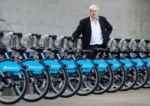
Robert Quick
Robert Quick resigns his role as head of counter-terrorism after details of a top secret document were filmed due to his casual way of handling his papers on the way to a meeting. The incident raises a depressing story of leadership and lack of it
The basic story is relatively simple to understand (although there are a few layers of political context which might also be worth considering). Bob Quick was until recently [9th April 2009] Deputy Commissioner with responsibilities for counter-terrorism at London’s metropolitan police force.
This week Commissioner Quick is filmed heading for a security briefing, holding a bundle of papers, in full view of the press, and maybe other surveillance cameras. The technology available revealed one document was exposing top secret information. This might have been a bit of a one-day story (tut tut, how careless, the man should be reprimanded). It turned out to have more significant implications.
Action against a major terrorist initiative was put at risk after enough details were revealed to the world’s press from the front page of the document which Quick was carrying as he entered No 10 Downing Street.
The action, allegedly against Al Qaida, was triggered prematurely to minimise damage which the security leak might have produced. Within 24 hours arrests were made in a coordinated action which seems to have achieved most of its goals. Damage limitation. Within another 24 hours Quick resigns over his security blunder.
Quite right too. Or was it?
‘Quite right too’ was the general reaction from press and public comment. ‘He had to go’. The case for the prosecution put pithily in the Sun (if you understand the Kwik-fit reference) with its front page shout You can’t quit quicker than a thick Quick quitter
Blundering police chief Bob Quick quit yesterday — in double-quick time. The anti-terror cop walked at 7.25am before he could be disciplined for compromising an operation to smash an al-Qaeda plot. It is thought fanatics were planning to cause carnage in Manchester within ten days.
A few dissenting voices were raised to the effect that he was a talented professional whose knowledge of terrorist threats to the country’s security was unparalleled. One letter to The Telegraph presented the minority contrary view
What a disaster to lose all those years of expertise because Bob Quick made one mistake, which I am sure he will never repeat. It once again shows the integrity of public servants and puts the politicians they serve in an even worse light. The Home Secretary should ask him to reconsider. By this resignation we are all much more vulnerable to the terrorists than as a result of the publication of a briefing document.
If this were a leadership exam ..
Tempting to see this as a suitable story for a leadership examination:
Complete this sentence drawing on your understanding of the resignation of counter-terrorist head Robert Quick
‘Bob Quick had to go because …’
Why the case is depressing me
Whipping off my black thinking hat and putting on a red emotional one I find the case a depressing one. Depressing because important leadership questions bothering me have been ignored. Depressing because in that respect the ‘story’ is like countless other leadership narratives, with focus on the immediate past and speculative commentary on the stupidity of the main characters and the potential enormity of the consequences of their actions.
So what’s missing?
Where to begin? On with a black professorial hat again, perhaps with a bit of green (for creative) trim. What’s missing is any evidence of leadership directed towards seeing this not as an isolated incident but as representative of a culture of sloppy security. What about action from home secretary Jacqui Smith? Maybe she is a bit distracted with recent personal problems, and maybe with the part played by the looming figure of London mayor Boris Johnson in the hiring and firing of police chiefs.
The Home Secretary (or maybe Gordon) would show welcome leadership with clear evidence of intent. It need not be more than a brief outline of action put in place (and not just another enquiry) to indicate what steps have been taken to protect sensitive information a bit better than as permitting a bundle of top secret papers to be ferried around in range of unwelcome cameras, and guarded only by a burly (about-to-be ex-) copper.
Acknowledgements
To Edward de Bono for his inspired little book on thinking hats, which he says he wrote on a long-haul plane journey.
To the kwik-fit ads which inspired the Sun headlines



 Posted by Tudor Rickards
Posted by Tudor Rickards 




 Click for regular updates
Click for regular updates